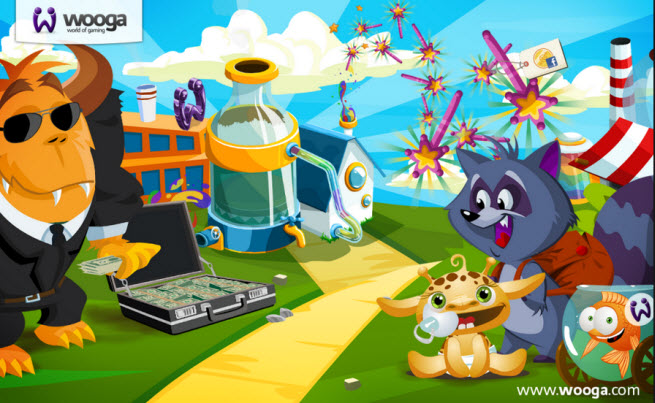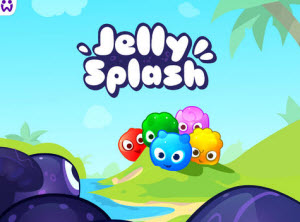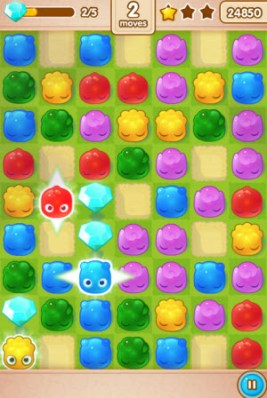Wooga is one of many social-game companies trying to break into mobile. In the past eight weeks, it found its way with Jelly Splash, a color-tile matching game with more than 10 million downloads in eight weeks on iOS.
Jens Begemann, chief executive of Berlin-based Wooga, talked about how much effort went into making Jelly Splash — launching today on Android — which has some unique riffs on games like Candy Crush Saga, Bejeweled, and Dots.
We sat down with Begemann for an interview in San Francisco last week. Here is a transcript of our talk.
GamesBeat: So what’s new at Wooga?
Jens Begemann: We launched a game eight weeks ago, Jelly Splash. It reached number one on the free charts at the App Store for a number of days. It’s now a top-20 grossing game in the U.S. and a dozen other countries. It’s continuing to grow fast. We’re over 10 million downloads now. We’ve also recently launched it on Facebook, and on Monday we’re launching on Android.
GamesBeat: How long did you work on that one?
Begemann: That was roughly a year. It’s relatively simple gameplay, but these simple games — easy to learn, hard to master — those are the most difficult to tune. It has some similarities to games like Candy Crush Saga. We created this map in 2010 for a game called Bubble Island. Then, it was taken over into other games.
The gameplay is very simple. You draw lines and connect these jellies, jellies of the same color. … It’s a bit like Dots, but it’s a level-based game, and you can also go diagonally. … It’s very simple. You just play until you have enough points. But it becomes more complex. If you go back to the map, you can choose a harder level. … We have more than 180 levels, where the objectives constantly change.
It’s become very popular all over the world. We had only an eight-week delay to get it on iOS, Facebook, and Android, which I think is much faster than most people have done it, and we’re already at 10 million downloads. It’s definitely our biggest launch so far.
The other thing we’re talking about is our strategy and how we see Wooga. We continue to be profitable, and we’ve roughly doubled our revenue each year. Revenue is currently 70 percent higher than it was last year. The market is consolidating. It’s much more about hits on mobile now. The key, for us, is to repeatedly bring out hits. We don’t just want to do one hit and live off it.
You can ask, then, what’s a hit? How do you define a hit? To us, it’s a game that does tens of millions of dollars in revenue across its lifetime. We’ve been on the market for four years, and by that standard, we’ve had five hits so far. Bubble Island was the first one, then Monster World, Diamond Dash, Pearl’s Peril, and now Jelly Splash has not yet crossed that $10 million mark, but it will soon. We’re quite happy with that.
Our goal is to create two to three more hits every year. We’ve changed our development approach quite a bit this year.
GamesBeat: How many people do you have now?
Begemann: More than 250 now. A bit more. We’re still growing. We’ve tried to grow a bit slower. We see that really small teams are the way to go. We have a few people in service areas and overarching corporate functions like PR or marketing or finance or customer care, but about 200 of those work in the game teams. We have 20 different game teams. Some of those are very small, maybe three people prototyping something, and some are bigger. But they’re very small teams where everyone has a big impact.
We continue to grow the headcount, but we don’t want to grow crazily. We believe that small teams of the right people represent the best way to go.
GamesBeat: We haven’t talked much since Clash of Clans and Puzzle & Dragons took over the market. What do you think of those developments?
Begemann: They’re crazy successful. Our goal is to regularly create hits, though. If you have that, you can finance lots of other titles. With a game that’s designed to create tens of millions of dollars, if the right things come together — timing and the market — it can become much bigger. That’s what’s happened with Clash of Clans and Gung Ho, a game that was a hit became huge — a super hit, you might call it.
GamesBeat: We talked to former Electronic Arts CEO John Riccitiello recently. He was saying that when you’re in the console space, what you want are the $10 billion properties. The brands aren’t really big until they’ve been around for five or 10 years. He was saying, well, how many people think Angry Birds will be in the top five, say, five years from now?
Begemann: Free-to-play games are services. You run them constantly, and they generate revenue every day. Even during the Christmas holidays, even on weekends, they generate revenues. The usage is very different. Something like GTA or Call of Duty, every year or every couple of years it gets a heavy increase in usage, and then it goes down again. In free-to-play games, it’s constant. To me, that’s worth even more.
If you look at the total revenue that a Clash of Clans has generated so far, it’s still probably smaller than Call of Duty, but it’s not so far away. One of these two markets is growing fast. One of these two business models is growing fast. You have to embrace the future. If you look backward too much, looking at what’s happened in the last 10 or 20 years, you won’t be successful in the next 10 years.
GamesBeat: We’ve seen some free-to-play games end their life. Zynga’s discontinued a lot of titles. Kabam’s discontinued a few. Is that something you’ll expect every game company to have to deal with?
Begemann: We’re very much embracing the notion of stopping projects. But we stop most of them before launch. We do many, many prototypes, and we move about 15 games into production every year. Every four months, we challenge and question each project. Should we continue working on this? That leads us to stop a lot of projects. If we don’t think a game has the potential to become a hit, the team works on something else. But then, when we launch, we work hard on making each game a hit. If it’s a hit, it justifies having a team on it for many years.
We have Monster World, which we launched more than three and a half years ago. There’s still a team on it, with a new version every week. We’re really happy with that. Maybe, at some point in the future, we’ll move that team to something else. But for us, it’s about sustainable long-term growth. Even if you move a team to something else, you can still keep the game online. We had one game some time ago where we switched it off, but at that point it had about as many users as you see in this room [Laughs]. We believe that as long as a game has lots of fans, you shouldn’t disappoint them. You should at least keep the service running.




